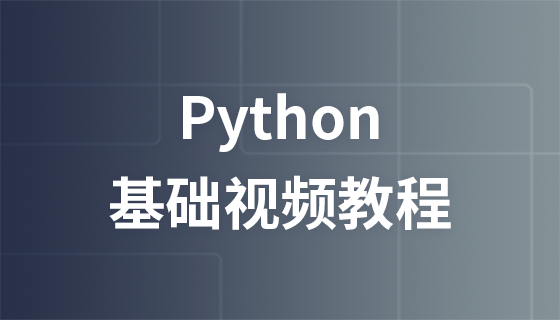
【相關學習推薦:python教學】
#實驗環境
##1.安裝Python 3.7# 51cto 博客页面数据插入mysql数据库
# 导入模块
import re
import bs4
import pymysql
import requests
# 连接数据库账号密码
db = pymysql.connect(host='172.171.13.229',
user='root', passwd='abc123',
db='test', port=3306,
charset='utf8')
# 获取游标
cursor = db.cursor()
def open_url(url):
# 连接模拟网页访问
headers = {
'user-agent': 'Mozilla/5.0 (Windows NT 10.0; WOW64) AppleWebKit/537.36 (KHTML, like Gecko) '
'Chrome/57.0.2987.98 Safari/537.36'}
res = requests.get(url, headers=headers)
return res
# 爬取网页内容
def find_text(res):
soup = bs4.BeautifulSoup(res.text, 'html.parser')
# 博客名
titles = []
targets = soup.find_all("a", class_="tit")
for each in targets:
each = each.text.strip()
if "置顶" in each:
each = each.split(' ')[0]
titles.append(each)
# 阅读量
reads = []
read1 = soup.find_all("p", class_="read fl on")
read2 = soup.find_all("p", class_="read fl")
for each in read1:
reads.append(each.text)
for each in read2:
reads.append(each.text)
# 评论数
comment = []
targets = soup.find_all("p", class_='comment fl')
for each in targets:
comment.append(each.text)
# 收藏
collects = []
targets = soup.find_all("p", class_='collect fl')
for each in targets:
collects.append(each.text)
# 发布时间
dates=[]
targets = soup.find_all("a", class_='time fl')
for each in targets:
each = each.text.split(':')[1]
dates.append(each)
# 插入sql 语句
sql = """insert into blog (blog_title,read_number,comment_number, collect, dates)
values( '%s', '%s', '%s', '%s', '%s');"""
# 替换页面 \xa0
for titles, reads, comment, collects, dates in zip(titles, reads, comment, collects, dates):
reads = re.sub('\s', '', reads)
comment = re.sub('\s', '', comment)
collects = re.sub('\s', '', collects)
cursor.execute(sql % (titles, reads, comment, collects,dates))
db.commit()
pass
# 统计总页数
def find_depth(res):
soup = bs4.BeautifulSoup(res.text, 'html.parser')
depth = soup.find('li', class_='next').previous_sibling.previous_sibling.text
return int(depth)
# 主函数
def main():
host = "https://blog.51cto.com/13760351"
res = open_url(host) # 打开首页链接
depth = find_depth(res) # 获取总页数
# 爬取其他页面信息
for i in range(1, depth + 1):
url = host + '/p' + str(i) # 完整链接
res = open_url(url) # 打开其他链接
find_text(res) # 爬取数据
# 关闭游标
cursor.close()
# 关闭数据库连接
db.close()
if __name__ == '__main__':
main()CREATE TABLE `blog` ( `row_id` int(11) NOT NULL AUTO_INCREMENT COMMENT '主键', `blog_title` varchar(52) DEFAULT NULL COMMENT '博客标题', `read_number` varchar(26) DEFAULT NULL COMMENT '阅读数量', `comment_number` varchar(16) DEFAULT NULL COMMENT '评论数量', `collect` varchar(16) DEFAULT NULL COMMENT '收藏数量', `dates` varchar(16) DEFAULT NULL COMMENT '发布日期', PRIMARY KEY (`row_id`) ) ENGINE=InnoDB AUTO_INCREMENT=1 DEFAULT CHARSET=utf8;

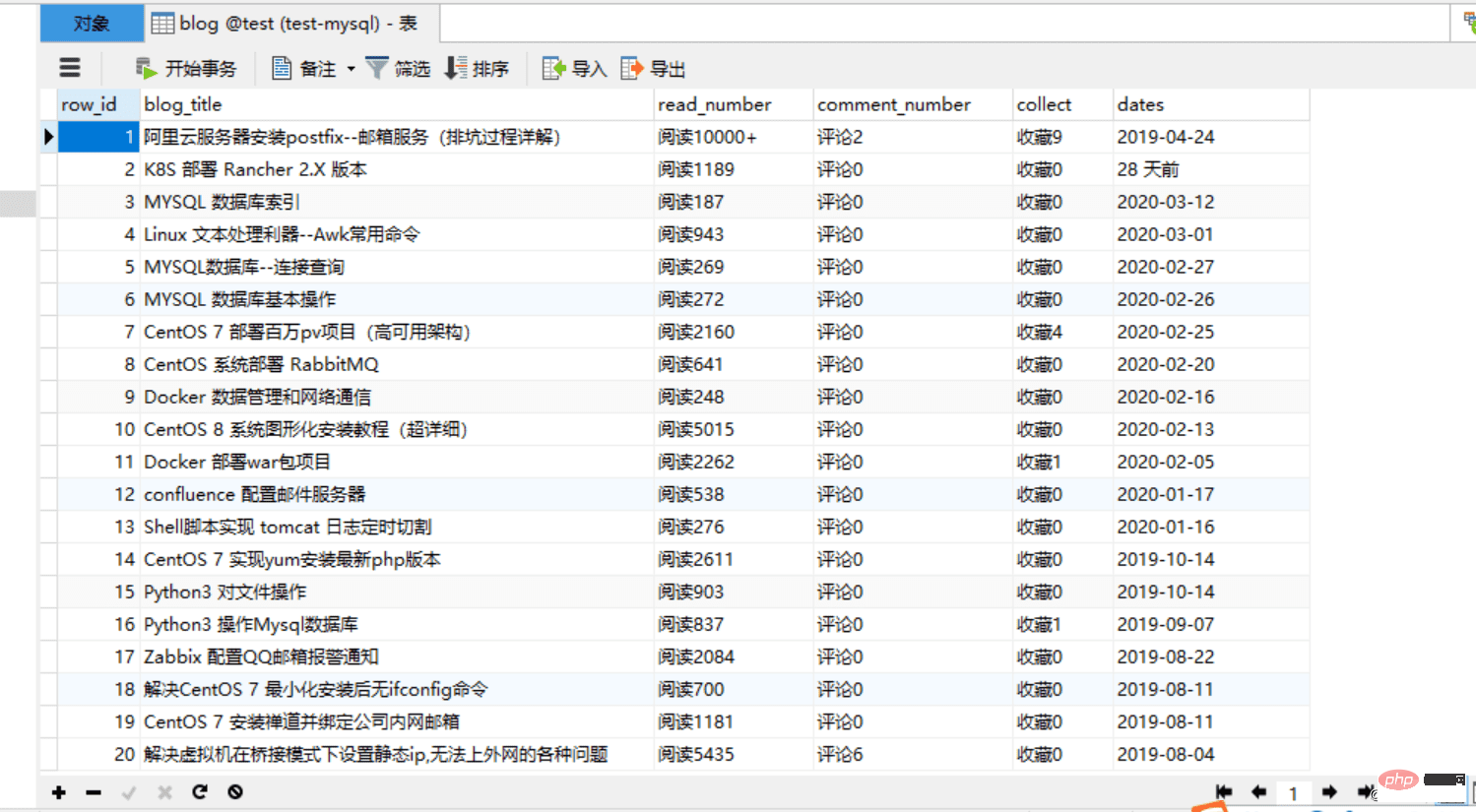
import re
import bs4
import pymysql
import requests
# 连接数据库
db = pymysql.connect(host='172.171.13.229',
user='root', passwd='abc123',
db='test', port=3306,
charset='utf8')
# 获取游标
cursor = db.cursor()
def open_url(url):
# 连接模拟网页访问
headers = {
'user-agent': 'Mozilla/5.0 (Windows NT 10.0; WOW64) AppleWebKit/537.36 (KHTML, like Gecko) '
'Chrome/57.0.2987.98 Safari/537.36'}
res = requests.get(url, headers=headers)
return res
# 爬取网页内容
def find_text(res):
soup = bs4.BeautifulSoup(res.text, 'html.parser')
# 博客标题
titles = []
targets = soup.find_all("a", class_="tit")
for each in targets:
each = each.text.strip()
if "置顶" in each:
each = each.split(' ')[0]
titles.append(each)
# 阅读量
reads = []
read1 = soup.find_all("p", class_="read fl on")
read2 = soup.find_all("p", class_="read fl")
for each in read1:
reads.append(each.text)
for each in read2:
reads.append(each.text)
# 评论数
comment = []
targets = soup.find_all("p", class_='comment fl')
for each in targets:
comment.append(each.text)
# 收藏
collects = []
targets = soup.find_all("p", class_='collect fl')
for each in targets:
collects.append(each.text)
# 发布时间
dates=[]
targets = soup.find_all("a", class_='time fl')
for each in targets:
each = each.text.split(':')[1]
dates.append(each)
# 插入sql 语句
sql = """insert into blogs (blog_title,read_number,comment_number, collect, dates)
values( '%s', '%s', '%s', '%s', '%s');"""
# 替换页面 \xa0
for titles, reads, comment, collects, dates in zip(titles, reads, comment, collects, dates):
reads = re.sub('\s', '', reads)
reads=int(re.sub('\D', "", reads)) #匹配数字,转换为整型
comment = re.sub('\s', '', comment)
comment = int(re.sub('\D', "", comment)) #匹配数字,转换为整型
collects = re.sub('\s', '', collects)
collects = int(re.sub('\D', "", collects)) #匹配数字,转换为整型
dates = re.sub('\s', '', dates)
cursor.execute(sql % (titles, reads, comment, collects,dates))
db.commit()
pass
# 统计总页数
def find_depth(res):
soup = bs4.BeautifulSoup(res.text, 'html.parser')
depth = soup.find('li', class_='next').previous_sibling.previous_sibling.text
return int(depth)
# 主函数
def main():
host = "https://blog.51cto.com/13760351"
res = open_url(host) # 打开首页链接
depth = find_depth(res) # 获取总页数
# 爬取其他页面信息
for i in range(1, depth + 1):
url = host + '/p' + str(i) # 完整链接
res = open_url(url) # 打开其他链接
find_text(res) # 爬取数据
# 关闭游标
cursor.close()
# 关闭数据库连接
db.close()
#主程序入口
if __name__ == '__main__':
main()CREATE TABLE `blogs` ( `row_id` int(11) NOT NULL AUTO_INCREMENT COMMENT '主键', `blog_title` varchar(52) DEFAULT NULL COMMENT '博客标题', `read_number` int(26) DEFAULT NULL COMMENT '阅读数量', `comment_number` int(16) DEFAULT NULL COMMENT '评论数量', `collect` int(16) DEFAULT NULL COMMENT '收藏数量', `dates` varchar(16) DEFAULT NULL COMMENT '发布日期', PRIMARY KEY (`row_id`) ) ENGINE=InnoDB AUTO_INCREMENT=1 DEFAULT CHARSET=utf8;
#末尾修改为:
if __name__ == '__main__':
main()
print("\n\t\t所有数据已成功存放数据库!!! \n")
time.sleep(5)pip install pyinstaller -i https://pypi.tuna. tsinghua.edu.cn/simple/
##2.在cmd視窗執行pyinstaller -F test03.py (test03為專案名稱)
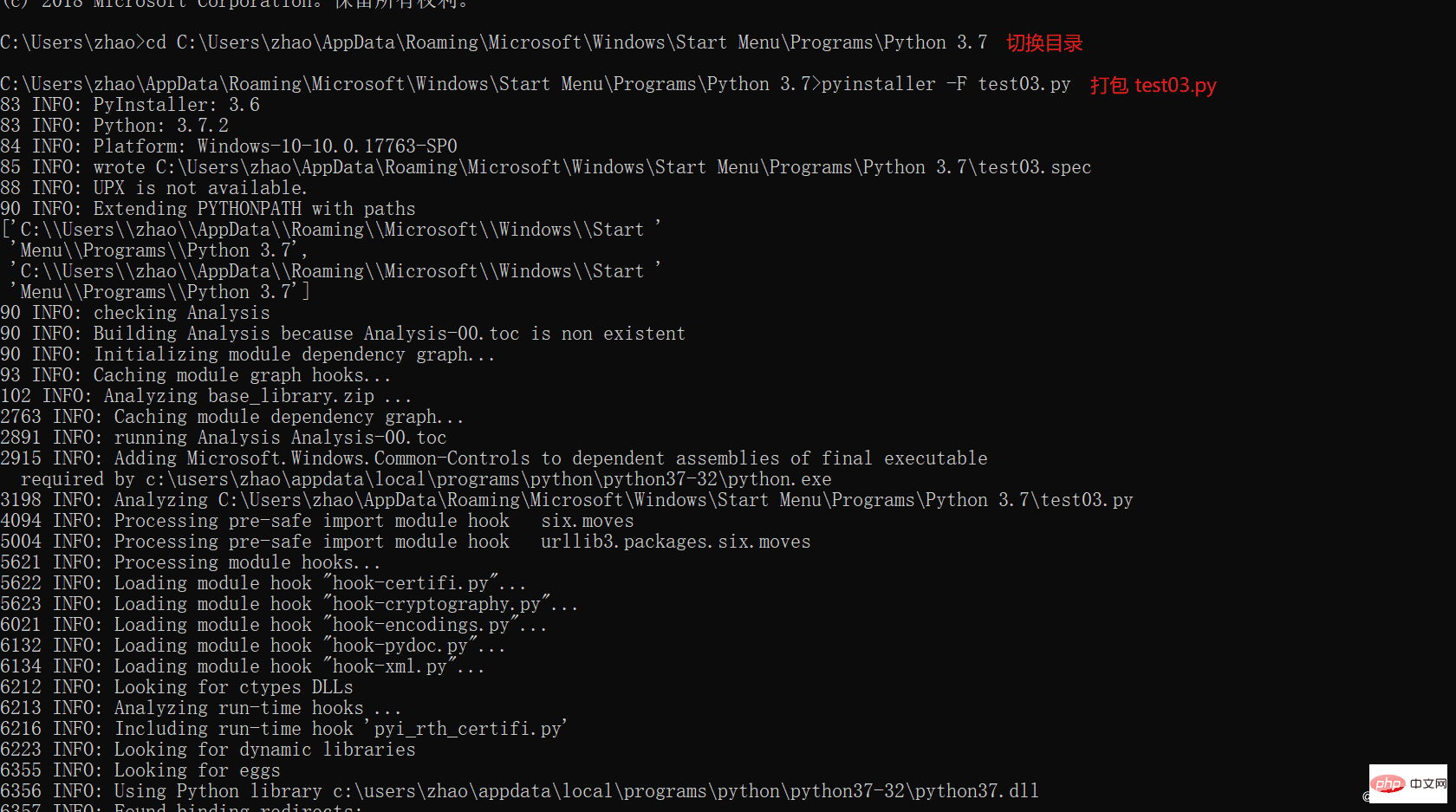 #4.查看exe套件
#4.查看exe套件
在打包後會出現dist目錄,打好套件就在這個目錄裡面
 5.運行exe包,查看效果
5.運行exe包,查看效果
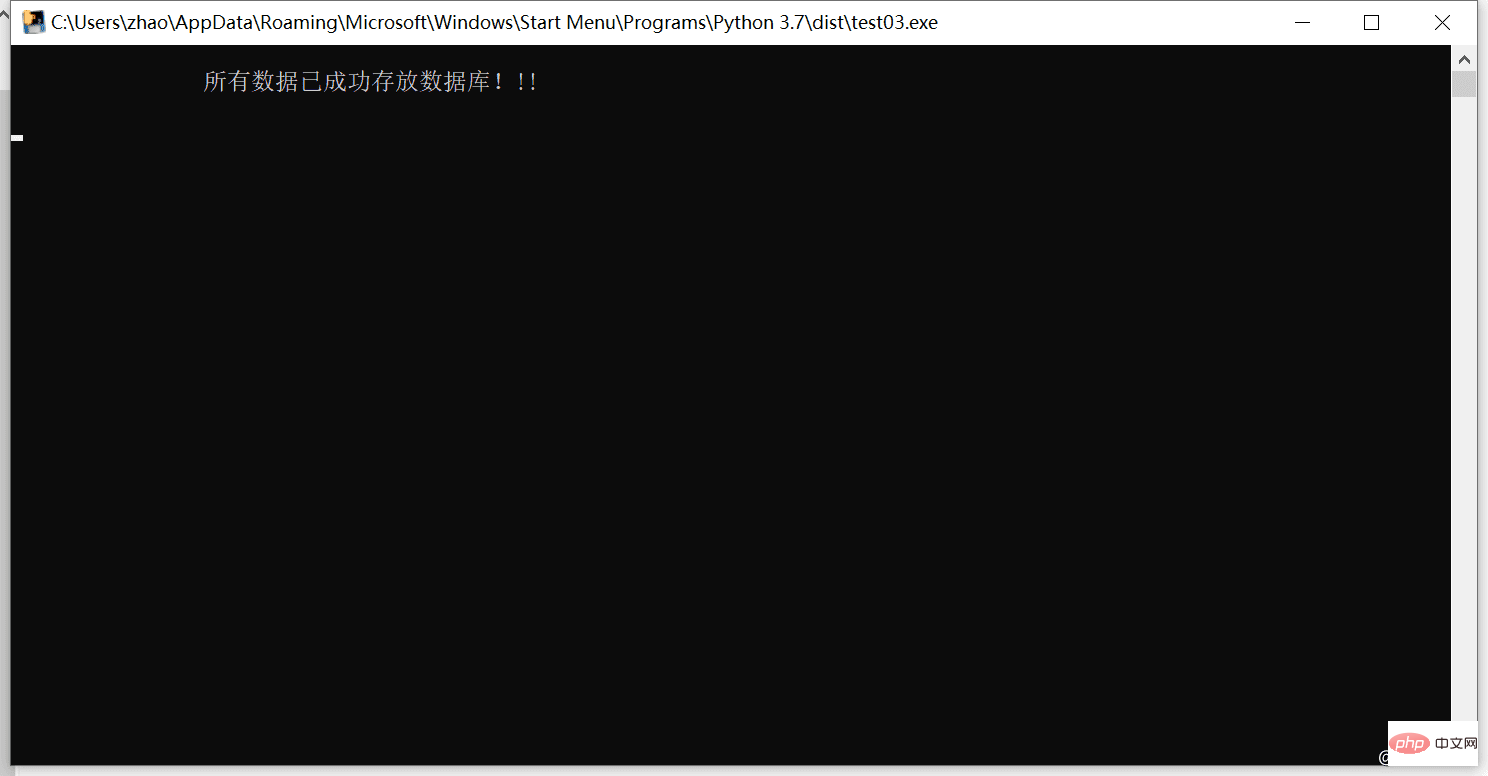 檢查資料庫
檢查資料庫
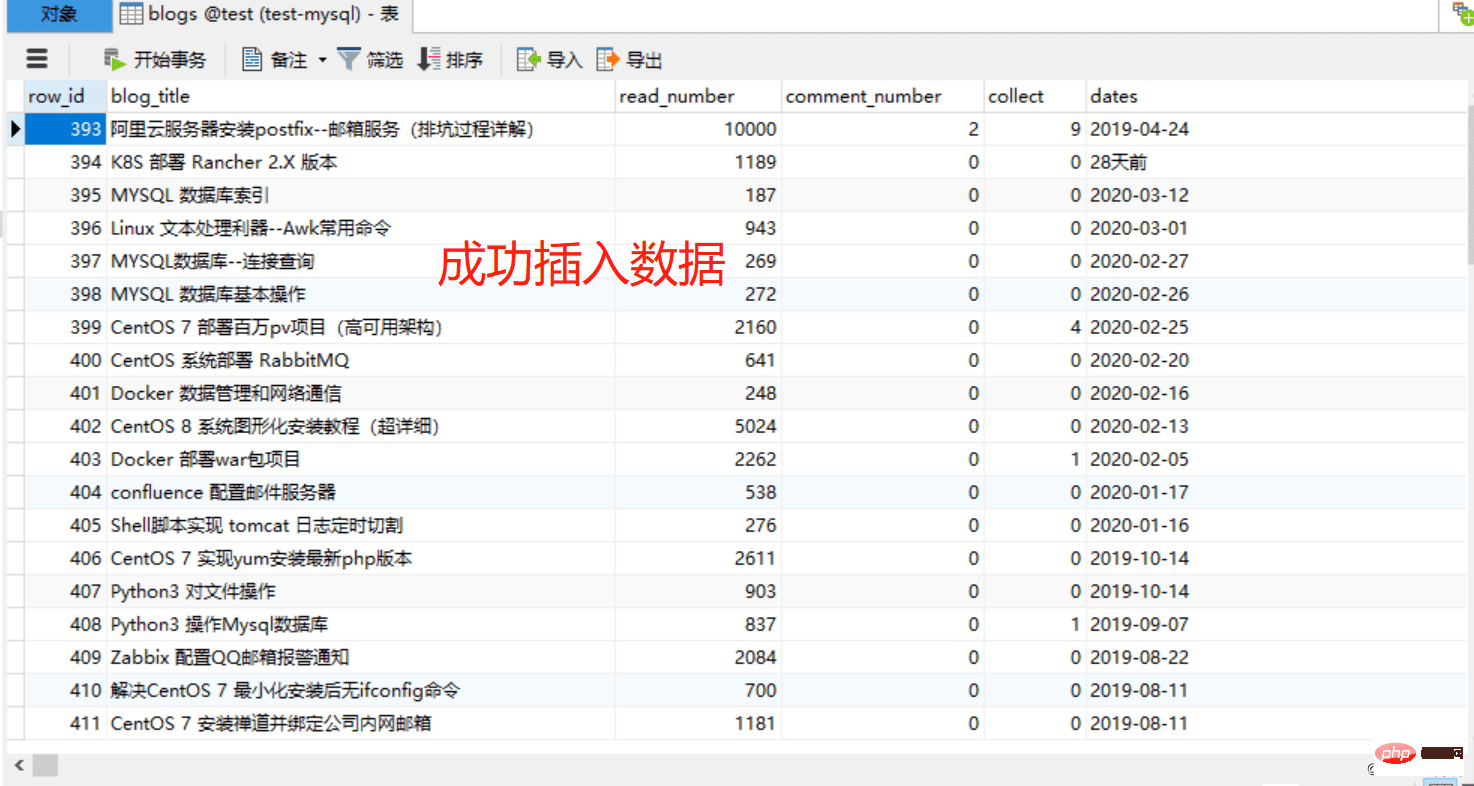
mysql教學
以上是Python爬取51cto資料存入MySQL方法詳解的詳細內容。更多資訊請關注PHP中文網其他相關文章!

